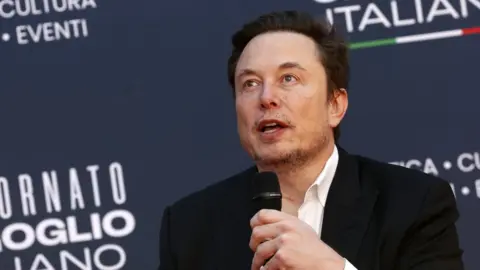Elon Musk wants control of Tesla with bigger stake
 Getty Images
Getty ImagesElon Musk has said he wants a bigger stake in Tesla, reviving debate over the size of the billionaire's pay package.
Mr Musk sold a large chunk of his shares in the electric car company less than two years ago to buy the social media platform Twitter, now called X.
He now owns around 13% of Tesla.
But he claims the current structure makes Tesla vulnerable to a "takeover by dubious interests" and he wants more control over its direction.
Mr Musk said he is particularly concerned about Tesla's investments in artificial intelligence (AI) features.
"I am uncomfortable growing Tesla to be a leader in AI and robotics without having 25% voting control," he wrote in an X post.
He added: "Unless that is the case, I would prefer to build products outside of Tesla."
Dan Ives, an analyst at Wedbush Securities, said the comments had created a "firestorm" for Tesla which has presented self-driving and automated capabilities as key to its future.
"If Musk ultimately went down the path to create his own company (separate from Tesla) for his next generation AI projects this would clearly be a big negative for the Tesla story," he wrote.
Mr Ives said he expected the board to be able to resolve the issue, but that in the meantime the comments would generate "drama".
"We also believe Musk having a back and forth about such an important issue over X is far from ideal for the investment community," he added.
Shares in Tesla opened more than 2% lower following the comments but ended the day flat.
Mr Musk, whose rank as world's wealthiest person is tied to his Tesla shares, said that the board of the firm was "great".
He said the firm was waiting for a court decision in the pending pay deal lawsuit to present a new compensation package.
Shareholder Richard Tornetta is taking legal action over a 10-year pay package that the board granted Mr Musk in 2018, which was worth about $55bn with much of it coming from share awards.
The package won approval from more than 70% of Tesla shareholders but the lawsuit argued that many of those shares belonged to people closely tied to Mr Musk.
Shareholder advisory groups had argued against the plan as overly-generous.
